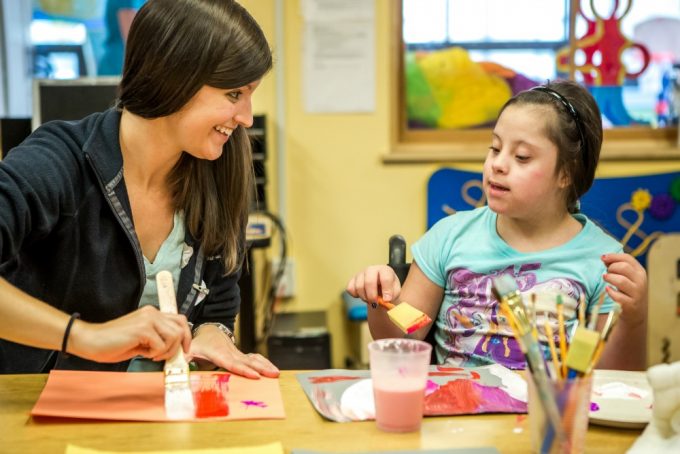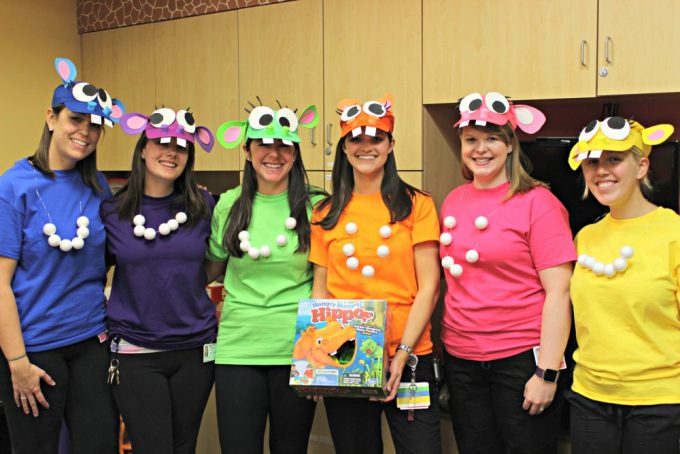Child Life: Tips for making medical experiences more comfortable for your child
At Franciscan Children’s, our Child Life Specialists work closely with children in our inpatient Pediatric Rehabilitation, inpatient Pulmonary Rehabilitation, and outpatient Surgical Services programs and can frequently be seen spreading their contagious, fun spirit throughout our campus. In honor of Child Life Month, we asked them to share some of their favorite strategies and tips for making medical experiences more comfortable for your child.

As Child Life Specialists at Franciscan Children’s, we help make medical experiences in both inpatient and outpatient programs less scary and more comfortable for our patients. We provide distraction and coping techniques for children and families, and use play to normalize the hospital environment and provide children with opportunities for self-expression.
Bringing your child to the dentist or the pediatrician may be “routine,” but we know that these visits often come with uncomfortable or new experiences that can be difficult or scary for kids. Here are a few simple tricks that you can use to make your child feel more comfortable during these experiences.

It is a common misconception that the less a child knows going in to a situation, the better. Many parents report not having shared anything with their child about their pending visit to keep them from feeling afraid. In actuality, children are sponges for information!
Studies show that children feel less anxious about experiences when they are appropriately prepared. Think about the last time you took your child somewhere new – how many questions did he or she ask before you got there? Questions like, how long will take to get there? Will we see this person? What kinds of toys will they have? To the same point, think about the most common phrase toddlers use as they begin to get comfortable with the world around them… “What’s this?!” Children are information-seekers. Similarly to most adults, they feel more in control of a situation when they are given honest information that helps them to know what to expect.
The most important thing to remember when preparing your child for a new experience is to be honest, but also to give them information in a way that is appropriate for their age. Below are some examples of honest but less-threatening phrases we use to talk to kids about medical experiences that can be stressful for kids:
Injections/Blood Draws = A small poke that might feel like a quick pinch
Teeth scraper = a silver tool the dentist uses to clean your teeth
Blood pressure cuff = a soft band that will give your arm a tight hug
Stethoscope = a microphone to help the doctors hear your heart
Anesthesia = a special medicine that helps you sleep so you won’t feel or hear anything while the dentist cleans your teeth
Looking for more substance? An example of what you might say to your child who needs to see their pediatrician for a sick visit would be:
Parent: “Today we are going to go and see your doctor, because she’s the one that can help you feel better. The doctor is going to gently listen to your heart, maybe look inside your mouth or your nose, and ask me some questions about how you are feeling. The doctor might give you some medicine to help you feel better too. Do you have any questions?”
Your child might ask: “Will I have to get a shot?”
Parent: “I don’t know exactly what the doctor will do to help you, but I will be there to make sure you are safe the whole time. Can you help me think about some things we can do together at the doctor today?”

We know that it can seem impossible to remember extra things when you already have diaper bags and backpacks full of essentials! However, studies show that children relax more quickly upon completion of a procedure and/or stay relaxed for longer leading up to a procedure when they are engaged in a preferred activity. Taking their attention away from the environment or procedure is a great strategy, and helping them to re-focus on that activity when they start to seem stressed can help to deescalate a child before they get too anxious.
A few of our favorite tools and techniques that are easy to find, pack, and bring along include:
Bubbles – Bubbles are always welcome in the hospital!
I Spy Books – I Spy books require children to focus to achieve the task at hand, so having one available (especially one themed with their favorite TV-show or character) can help them focus for long periods of time. If you engage with them and prompt them frequently to find new things, it can keep their attention as they strive to meet the challenge!
Light up toys – Toys that spin or light up can be a great attention stealer. Light-up yo-yos or spinner wands can often be found in the dollar bin and are great for a quick distraction.
iPads/iPhones – We love using our iPads to distract children, but it’s key to remember that these tools are most effective when the content is new to the child. If the child plays with an iPad or iPhone frequently, it likely won’t be enough to take their attention away from something worrisome. Downloading a new app that you present and engage them in right before a stressful event is often more effective in engaging their attention and getting them excited about something new.
Singing – Especially for babies and toddlers, a soothing voice and a favorite song can be just enough to help a child feel safe and calm!
Give them a job – This is a simple strategy that helps children to focus and feel useful. We often tell children their job is to hold something important, or to count how many of something they see on the wall, or to teach you the words to a song you don’t know (or pretend not to know)!

Did you know that children feel most vulnerable when they are lying flat on their backs? While there are certainly appointments and/or procedures where this can’t be avoided, there are many times when changing your child’s physical orientation can ease their anxiety.
As Child Life Specialists, we coach parents to use “comfort positions,” because we know that children feel most comfortable and safe when they are with their caregiver. Below are some examples of common medical experiences, and the comfort positions that can make these experiences easier for your child.
For a thigh or upper arm injection – Have your child sit on the edge of the exam table. Come up in front of them and give them a big bear hug from the front, turning their head to the opposite direction of the shot if the child prefers not to watch. Remember, some children feel more in control and therefore less anxious when they do watch, so for children ages 3+, always offer them the choice!
For a strep test – Hold your child on your lap, with them facing outward. Give them a big bear hug, wrapping your arms tightly around theirs, securing them down in a comfortable and safe way that doesn’t feel restrictive.
For a visit to the dentist – Sit as close to their head as possible and hold their hands, even give them a soothing hand or arm massage if they enjoy it. If they can’t see you while leaning back, having you hold an arm or hand, and even prompting them to squeeze it, ensures them along with your voice that you are still there. You can even have them sit in your lap in the dental chair, if it is okay with the dentist.
For more information on comfort positions, you can visit our friends at Nationwide Children’s here or Children’s Mercy Kansas City here.
Experiencing new medical procedures can be a challenge for children, but we know it can be just as hard on parents to see their child anxious or upset. Remind yourself to take deep breaths and remain a calm, reassuring presence for your child. We hope that these tips and techniques will help you as you tackle new experiences together!

Thank you to our talented Child Life team for the invaluable work you do to support our children and families. We appreciate your commitment to making Franciscan Children’s a playful, vibrant place, so every kid can PLAY!
View All Blog Stories